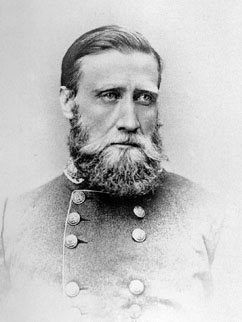| John Bell Hood  Born: 29-Jun-1831 Born: 29-Jun-1831
Birthplace: Owingsville, KY
Died: 30-Aug-1879
Location of death: New Orleans, LA
Cause of death: Yellow Fever
Remains: Buried, Metairie Cemetery, New Orleans, LA
Gender: Male
Race or Ethnicity: White
Occupation: Military Nationality: United States
Executive summary: Confederate General Military service: US Army; Confederate Army The American soldier John Bell Hood, Lt. General of the Confederate army, was born at Owingsville, Kentucky, in 1831, and graduated from West Point military academy in 1853. As an officer of the 2nd U.S. cavalry (Colonel Albert Sidney Johnston) he saw service against Indians, and later he was cavalry instructor at West Point. He resigned from the U.S. service in 1861, and became a colonel in the Confederate Army. He was soon promoted brigadier-general, and at the battle of Gaines's Mill, where he was wounded, won the brevet of major-general for his gallant conduct. With the famous "Texas brigade" of the Army of Northern Virginia he served throughout the campaign of 1862. At Gettysburg he commanded one of the divisions of James Longstreet's corps, receiving a wound which disabled his arm. With Longstreet he was transferred in the autumn of 1863 to the Army of Tennessee. At the battle of Chickamauga (September 19th and 20th) Hood was severely wounded again and his leg was amputated, but after six months he returned to duty undaunted. He remained with the Army of Tennessee as a corps commander, and when the general dissatisfaction with the Fabian policy of General Joseph Eggleston Johnston brought about the removal of that officer, Hood was put in his place with the temporary rank of general. He had won a great reputation as a fighting general, and it was with the distinct understanding that battles were to be fought that he was placed at the head of the Army of Tennessee. But in spite of skill and courage he was uniformly unsuccessful in the battles around Atlanta. In the end he had to abandon the place, but he forthwith sought to attack William T. Sherman in another direction, and finally invaded Tennessee. His march was pushed with the greatest energy, but he failed to draw the main body of the enemy after him, and, while Sherman with a picked force made his "March to the Sea", Thomas collected an army to oppose Hood. A severe battle was fought at Franklin on the 30th of November, and finally Hood was defeated and his army almost annihilated in the battle of Nashville. He was then relieved at his own request (January 23rd, 1865.) After the war he was engaged in business in New Orleans, where he died of yellow fever on the 30th of August 1879. His experiences in the Civil War are narrated in his Advance and Retreat (New Orleans, 1880). Hood's reputation as a bold and energetic leader was well deserved, though his reckless vigor proved but a poor substitute for Johnston's careful husbanding of his strength at this declining stage of the Confederacy. University: US Military Academy, West Point (1853)
Relieved of Command 23-Jan-1865
Author of books:
Advance and Retreat (1880, memoir)
Do you know something we don't?
Submit a correction or make a comment about this profile
Copyright ©2019 Soylent Communications
|